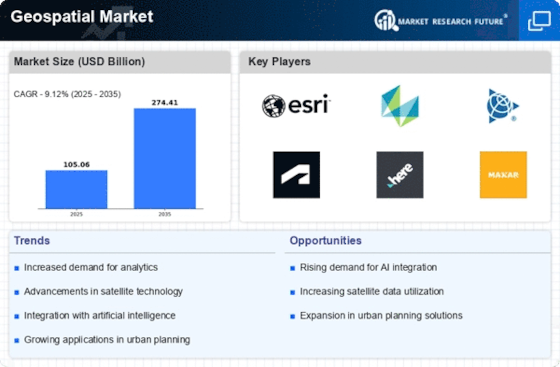Top Industry Leaders in the Geospatial Market

Competitive Landscape of Geospatial Market:
The geospatial market, characterized by the integration of location-based technologies, has witnessed significant growth in recent years. As businesses across various industries increasingly recognize the value of spatial data for decision-making, the competitive landscape of the geospatial market has evolved dynamically. Key players in this market have implemented strategic initiatives to gain a competitive edge and capitalize on the expanding opportunities within the sector.
Key Players:
- Bentley Systems Inc. (U.S.)
- DigitalGlobe Inc. (U.S.)
- General Electric Co. (U.S.)
- Harris Corporation (U.S.)
- Dettwiler & Associates Ltd. (Canada)
- ESRI (U.S.)
- Hexagon AB (Sweden)
- Fugro N.V. (Netherlands)
- MacDonald
- Trimble Navigation LTD (U.S.), among others
Strategies Adopted:
- Diversification of Product Portfolio: Key players have diversified their product portfolios to address the specific needs of different industries. This approach enables them to capture a broader market share by offering tailored solutions.
- Collaborations and Partnerships: Strategic collaborations and partnerships with other technology providers, industry players, and government agencies have become common. These alliances facilitate the exchange of data and technology, fostering innovation and market growth.
- Investment in Research and Development: Continuous investment in research and development remains a cornerstone for many companies, ensuring the introduction of cutting-edge technologies and staying ahead in the competitive landscape.
- Global Expansion: To capitalize on emerging markets and regional opportunities, key players have expanded their geographical presence. This expansion enables them to tap into diverse customer bases and adapt solutions to regional requirements.
Factors for Market Share Analysis:
- Innovation and Technology Integration: Companies leading in innovation and effectively integrating new technologies into their geospatial solutions gain a competitive advantage. This includes advancements in artificial intelligence, machine learning, and real-time data processing.
- Industry Focus and Specialization: Key players that focus on specific industries, such as agriculture, healthcare, or smart cities, tend to dominate within those sectors. Specialization allows for the development of industry-specific expertise and tailored solutions.
- Customer Base and Relationships: Strong relationships with a diverse customer base contribute significantly to market share. Companies with established partnerships and long-term customer relationships are more likely to retain and expand their market presence.
- Data Accuracy and Quality: The accuracy and quality of geospatial data are critical factors for market share analysis. Companies that provide reliable, up-to-date, and high-resolution data have a competitive edge over others.
New and Emerging Companies:
- Orbital Insight: Specializing in geospatial analytics, Orbital Insight leverages satellite imagery and artificial intelligence to provide actionable insights for various industries, including finance, energy, and agriculture.
- CARTO: Focused on location intelligence and spatial analysis, CARTO offers a cloud-based platform for organizations to visualize and analyze geospatial data, catering to sectors like retail, real estate, and logistics.
- Sparkgeo: As a geospatial consultancy and product development company, Sparkgeo assists businesses in leveraging location data. The company's expertise extends to web mapping, geospatial application development, and spatial analysis.
Current Company Investment Trends:
- Artificial Intelligence and Machine Learning: Companies are heavily investing in integrating artificial intelligence and machine learning into their geospatial solutions. This trend aims to enhance the automation, analysis, and interpretation of large datasets.
- Cloud-Based Geospatial Services: The shift towards cloud-based geospatial services is evident, with companies investing in scalable and flexible solutions. Cloud platforms offer enhanced accessibility, collaboration, and cost-effectiveness for both providers and users.
- IoT Integration: The integration of geospatial data with the Internet of Things (IoT) is a growing trend. Companies are investing in solutions that combine real-time location data with sensor information, enabling a more comprehensive understanding of physical environments.
- Blockchain for Geospatial Applications: Some companies are exploring the use of blockchain technology to enhance the security and reliability of geospatial data. Blockchain can provide transparency and immutability, addressing concerns related to data integrity.
Latest Company Updates:
Jan 2024: GISCI welcomes new December 2023 GISPs - The Geospatial Information Systems Certification Institute (GISCI) announced the addition of new members to its Certified GIS Professional (GISP) program.
Jan 2024: Auburn University joins GISCI Endorsing Employers - Auburn University has become the latest GISCI Endorsing Employer, recognizing the value of GIS certification for its students and graduates.
Jan 2024: Launch of Geospatial Innovation Awards 2024 - The Geospatial Innovation Awards 2024 are now open for entries, recognizing outstanding achievements in the geospatial industry.
Jan 2024: Bluesky partners with Sensat for new visualization tool: Bluesky, a satellite imagery company, has partnered with Sensat, a geospatial analytics provider, to develop a new visualization tool for analyzing Earth observation data.
Jan 2024: Record high government space spending - Global government space spending reached a new high in 2023, driven primarily by defense expenditures. This trend is expected to continue, further boosting the geospatial industry.










